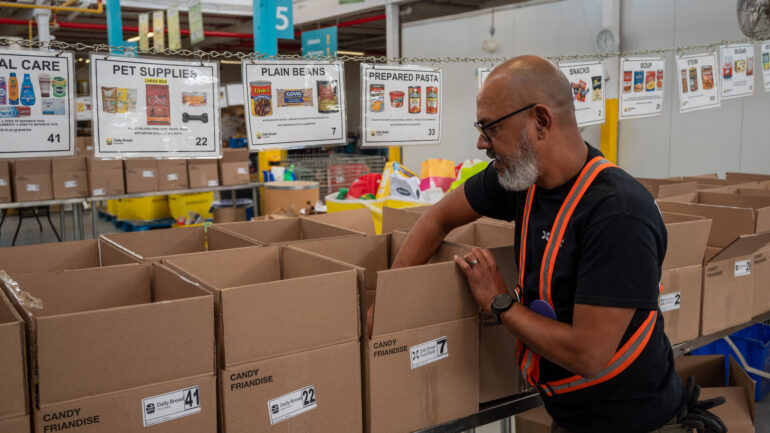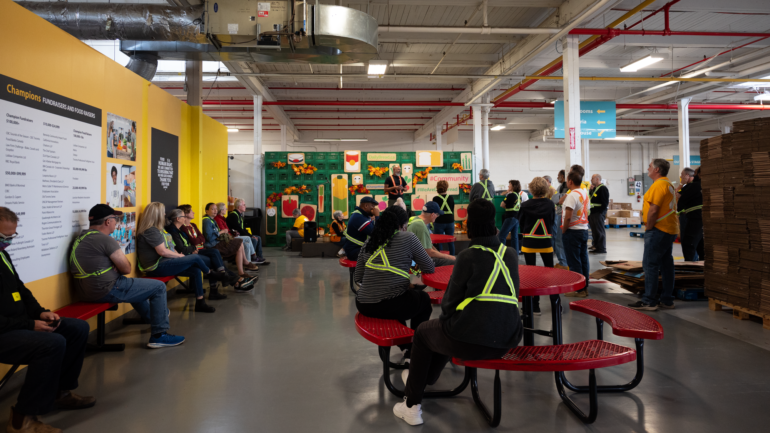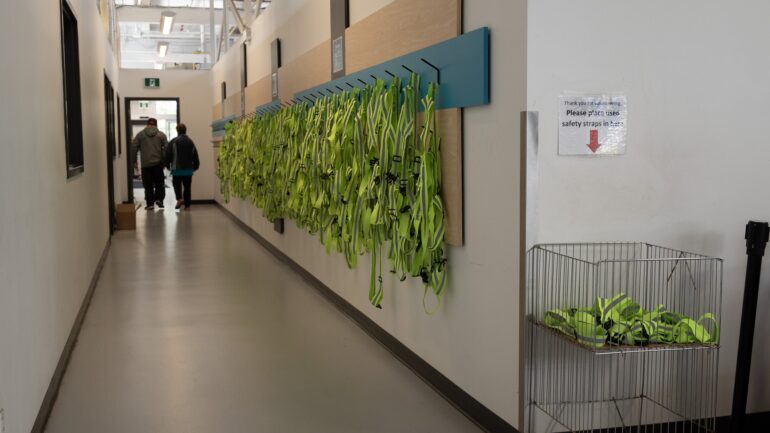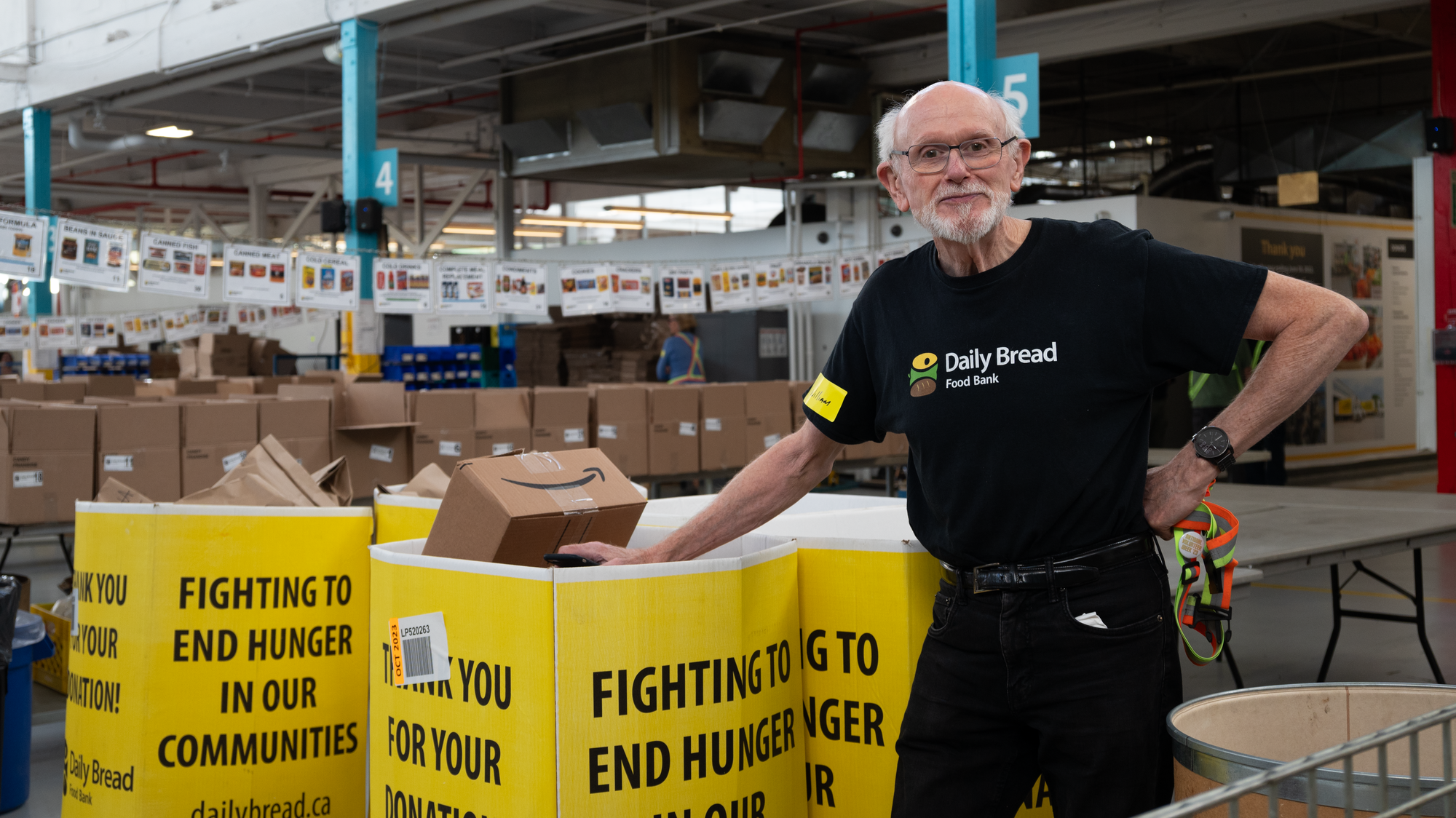William Brisland volunteers at the Daily Bread Food Bank for two half days each week, stationing himself in the sorting department.
As he studies each item, he imagines a little kid somewhere who will soon have breakfast.
He was placed in the food bank area when he started in 2020. By the third week, he asked to be relocated as he couldn’t bear seeing children who come in with empty stomachs.
For Brisland, Daily Bread runs like a “well-oiled machine,” volunteers move donations through aisles, categorize essential items using lists and picture labels on top of boxes, take scheduled breaks, and occasionally share the lunch table with the CEO.
So, while staff shortages and burnout are top concerns for charities, according to the latest CanadaHelps’ Annual Giving Report, volunteers like Brisland aren’t fazed.
“They treat us well because we are, in a sense, the lifeblood to turn this stuff around,” Brisland said.
Scottish artist Brisland immigrated to Canada in 1974 and worked as a part-time consultant designer for Humber College interior design professors.
Now retired, he said helping at the food bank is his way of giving back to the country.
Françoise Mathieu, a specialist in organizational stress and trauma-exposed work, said passionate front-line workers, especially new and young ones, may find it challenging to set boundaries or manage secondary trauma, moral distress and burnout.
“If it is not a safe environment, psychologically or physically, do you have access to a good supervisor who has your back,” Mathieu said while quoting questions volunteers can ask to survey their target organizations.
“Look at the workplace vibe,” Mathieu said.
“Because despite all the challenges I’ve listed, I know people who have been involved for a long time. They are still positive. They’re not cynical.”
“They speak respectfully about their clients. Those are the things I’d want to look for,” Mathieu said.

Damion Balbour, team leader at the Daily Bread Food Bank, checks the essential items sorted by volunteers. Photo credit: Annicca Albano
Food Banks Canada’s report revealed that 18 per cent of Canadians, or one in five people, face food insecurity.
Daily Bread doubles as a distribution hub, supplying Fort York Food Bank (FYFB) and other partners.
At FYFB, volunteer Maya Kanakaratnam coordinates the deliveries from the trucks to the pallets in the kitchen where some food is turned into hot meals, then to the storefront so clients can help themselves to whatever they and their families need.
The retired management consultant, on Mondays, forecasts the demand for the following week, keeping in mind clients’ allergies and dietary preferences.

Volunteers at the Daily Bread Food Bank gather to delegate and discuss tasks. Photo credit: Annicca Albano
During the pandemic, she started volunteering at FYFB, a multi-service agency co-founded by her neighbour Devi Arasanayagam.
“There wasn’t very much I could do,” Kanakaratnam said. “So I met with her, and she talked about challenges here. I said, ‘Do you need any help?'”
Arasanayagam said depending on their interests expressed in orientations, volunteers assume different roles and are provided the necessary training, from de-escalation to personal wellness.
Those with cars drive and distribute the food. Writers produce newsletters. Multi-lingual speakers offer information support to newcomers and refugees. Others promote fundraisers.
In turn, she said volunteers from different walks and stages of life get mandatory community hours, Canadian experience and job references.
Flexibility, for Arasanayagam, also means allowing months-long breaks and group volunteering.
“There’s all kinds of wonderful things, but check out your local food bank to see what their needs are,” she said.
“Come with an open heart,” volunteer Kanakaratnam said. “No expectations.”
We are thankful for our many volunteers, community groups, corporate groups and leadership, that enable us to continue to meet the needs of our community. This week Tuesday we served 1020, Wednesday 523 and another 578 today. We are grateful to be here & ready to serve. pic.twitter.com/CDqfP9yIJk
— Fort York Food Bank (@FYfoodbank) July 21, 2023
Fateha Hossain was still an international development student at the University of Toronto Scarborough when they started campus-based food insecurity work.
“It coincided with me moving out of home for the first time. I was 18 and really didn’t know how to feed myself,” they said.
Hossain, now 27, works as a Good Food Markets Facilitator at FoodShare Toronto, assisting farmers in setting up markets to provide culturally appropriate and affordable produce to neighbourhoods.
They said they work alongside colleagues who have lived experiences with food insecurity and its intersections or have marginalized identities.
“The work that we do is work that we really care about and really connect to,” Hossain said, adding that FoodShare compensates all workers with a living fair wage for their time and efforts.

A row of yellow safety straps waiting to be worn by volunteers at the Daily Bread Food Bank. Volunteer wellbeing is a top concern among food justice organizations. Photo credit: Annicca Albano
They said being an engaged citizen is crucial today and that youth mobilization is needed to address hunger, homelessness, transit and climate.
To avoid shock, Hossain said food justice workers can educate themselves.
“I think that work is often very underfunded or undervalued,” Volunteer Canada CEO Megan Conway said, adding that people are actively looking for ways to participate in issues they see in their community.
“Volunteers are the ones that are showing up,” Conway said.
She said charities experiencing burnout could take cues from others.
Conway told Humber News they should review strategies at the leadership level, from improving volunteer welcome, engagement, recognition and access to training resources from experts or volunteer centres.
She also encourages volunteers to research to ensure they’re not exploited.
“We need to find ways to celebrate volunteers and their contributions in a much more direct and focused way,” Conway said.

